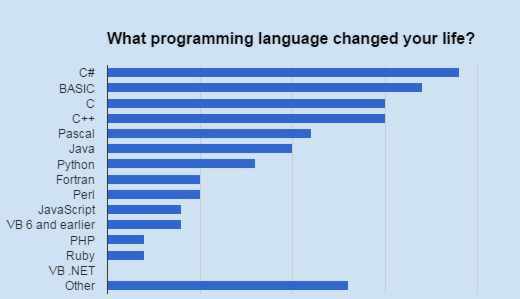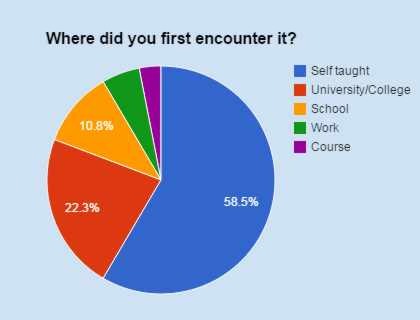| Poll Results - Languages That Repay |
| Written by Janet Swift |
| Tuesday, 09 December 2014 |
|
Last week on I Programmer we asked about where you first encountered the programming language that got you started as a programmer. Now we can reveal the results of our poll and it reveals some interesting trends The ROI Survey was inspired by an xkcd cartoon which suggested that a weekend spent "messing around with Perl" was of much more value to a future career than formal classroom teaching. And given that this week is computer science education week we also wondered how many programmers had learned their significant language at school. The poll asked two questions and the charts below show the responses:
C# was easily the winner in terms of languages but nobody at all selected VB.NET - which is perhaps a surprise given that BASIC was the second most popular choice and if you add in VB6 and earlier versions then it would have topped the poll. We had an interesting variety of "Other languages" many of them being languages that were popular in their day but might now be assigned to the "legacy" category - including COBOL and Forth. We also had one vote for EDSAC Autocode - and we would love to know more about those experiences. At the more recent end of the spectrum we also had some responses of F# and R. We supposed that school or some educational input would have been a common way of learning a first language, but it seems that xkcd might be right. In general School hasn't played much of a role in getting our readers where they are today.
As you see from this chart, the majority of those who responded to the survey revealed they were self taught in the language they consider has given them that initial experience. Rather than having had it thrust upon them at school or university (totalling 33% combined) most were self-taught (58.5%). Work only accounted for a further 5% of "formal" teaching. Online courses such as MOOCs accounted for only 2% of the responses, with 50% of them paired with JavaScript, and in the chart they are put together with a small number of classroom-based courses and certification. Overall, there seems to be a pattern that the older languages were first encountered at school or university. More modern languages tended to be self taught. My guess is that this has more to do with the way education has changed over time than any great difference in the languages. The most extreme was the Fortran group with none at all being self taught! Over 60% of the Fortran group first encountered it at school and the rest met it at college or university. In the case of BASIC combined with VB6 and earlier (16%), self-taught accounted for 95%. All of the Perl respondents were self taught. One anomaly is that while 87% of the C++ group were taught it in the classroom this applied to only 27% the C group, a discrepancy that is difficult to explain. Java seems to sit on the edge of the changeover with a 50:50 split into self taught v university/college but no one had encountered Java at school. In the case of C#, the most popular language, three quarters were self taught. Admittedly there might be other factors at play rather than just what the educational establishments were teaching. For example, Fortran generally needed a mainframe or a mini-computer so self-taught wasn't really an option. However, it has to be a sobering fact, even for a poll intended for fun rather than statistical evidence, that around 60% of the respondents claimed to be self taught - what other profession would this be true of? We can only hope that Computer Science Education Week and initiatives such as the Hour Of Code raise the number of programmers who can look back fondly at learning something great at school - and not during free time. Thanks to everyone who took part - and if you want to tell us more use the comments section below.
To be informed about new articles on I Programmer, install the I Programmer Toolbar, subscribe to the RSS feed, follow us on, Twitter, Facebook, Google+ or Linkedin, or sign up for our weekly newsletter.
Comments
or email your comment to: comments@i-programmer.info
|
| Last Updated ( Tuesday, 09 December 2014 ) |



